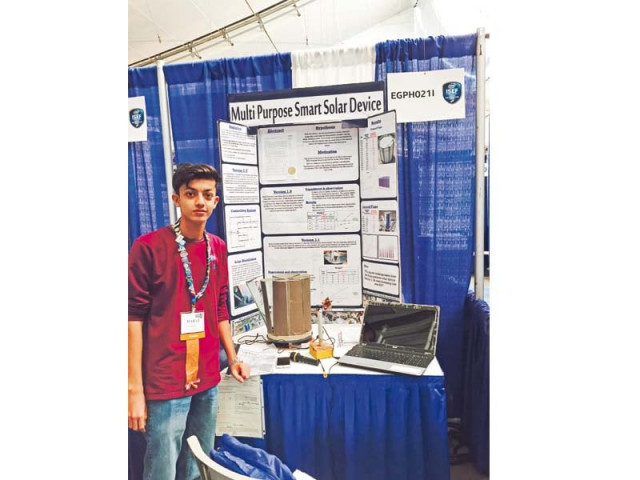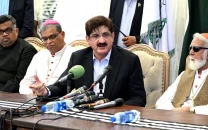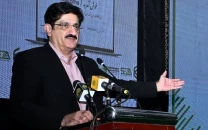Dream big: Teenage student wins third place at Intel science fair
Habab Idrees was competing against 1,700 young scientists from across the globe

Habab Idress shows off his solar-powered thermostat device at the Intel International Science and Engineering Fair in Pittsburg. PHOTO: EXPRESS
Habab Idrees was one of eight Pakistani students who presented their science projects at the Intel International Science and Engineering Fair (Isef) 2015, held in Pittsburgh, United States, from May 10 to May 15. He earned third place in the 'Energy: Physical' category for his project of a solar-powered multipurpose thermostat device.

The teenage boy, a resident of Korangi, had developed a device to find an energy-saving, cost-effective way to maintain the temperature for things, such as water tanks, amid changes in weather. "With this device, we can achieve many things — controlling the temperature of water, drying fruit, distilling water and increasing biogas production," he explained, adding that he wanted to help the poor through his invention, which he says was inspired by a lotus plant.
"I remember the moment when they called out my city and country — I was so proud," he recalled, jubilant at winning third place and prize money of $1,000. "It feels amazing to be one of the best young inventors of the world."
Ahead of his win, Idrees, who dreams of becoming one of Pakistan's top scientists someday, claimed, "Winning is not everything but it will feel great if I can get Pakistan's name on the board." He qualified for Isef after winning the National Science Competition organised by Intel Pakistan in February.
Along with him, three students from Lahore, two others from Karachi, one from Vehari and one from Khairpur were also selected to present their projects at Isef. One of them, Muhammad Ahsan Nawaz, had been nominated for the science fair for the second time.
"The Intel Science Fair was amazing — it recognised our hard work and gave us the opportunity to present our projects," said Ali Khan from Karachi.
The only girl among the eight Pakistani students, Kiran Karim, also from Karachi, agreed with him. "Isef is the best, most innovative platform for creating and nurturing scientific thought," she believed.
"While it is a great opportunity to promote science, it is also wonderful for meeting new, like-minded people," added Shadab Rasool from Vehari. "I made a lot of friends and even taught them how to perform bhangra!"
The three students from Lahore were Aurangzeb Ahmed, Syed Ali Ahsen Muhammad Jafry and Tohami Bin Shafiq.
The Isef brought together young scientific minds from 64 countries, showcasing their talent on an international stage. Their projects were judged by doctoral-level scientists, allowing them to compete for over $3 million in prizes and scholarships.
The Intel ISEF unites these top young scientific minds, showcasing their talent on an international stage, enabling them to submit their work to judging by doctoral level scientists-and providing the opportunity to compete for over $3 million in prizes and scholarships.
Published in The Express Tribune, May 28th, 2015.



















COMMENTS
Comments are moderated and generally will be posted if they are on-topic and not abusive.
For more information, please see our Comments FAQ